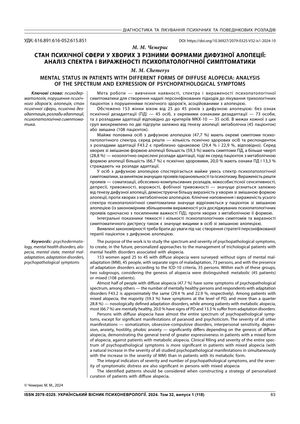TLDR Women with mixed alopecia have more severe mental health issues than those with metabolic alopecia.
The study analyzed the mental health of 153 women aged 25-45 with diffuse alopecia, finding that nearly half (47.7%) exhibited psychopathological symptoms. Patients with mixed alopecia had higher severity and a broader range of symptoms, including somatization, obsessive-compulsive disorders, and anxiety, compared to those with metabolic alopecia. The General Symptomatic Index (GSI), Positive Symptomatic Index (PSI), and Positive Distress Symptomatic Index (PDSI) were significantly higher in patients with mixed alopecia. These results highlight the need for personalized treatment strategies that consider the mental health impact of alopecia.
1 citations
,
April 2022 in “Journal of Cosmetic Dermatology” Androgenetic alopecia causes significant psychological distress, especially in women, and requires both medical and psychological support.
 7 citations
,
October 2021 in “Indian Journal of Plastic Surgery”
7 citations
,
October 2021 in “Indian Journal of Plastic Surgery” Hair loss patients need psychological counseling to cope better.
 46 citations
,
August 2019 in “Journal of the European Academy of Dermatology and Venereology”
46 citations
,
August 2019 in “Journal of the European Academy of Dermatology and Venereology” People with hair loss conditions experience more anxiety, depression, and a lower quality of life than those without these conditions.
 January 2009 in “Springer eBooks”
January 2009 in “Springer eBooks” The document concludes that treating skin conditions should include psychological care and a multidisciplinary approach is essential for effective management.
 14 citations
,
April 2014 in “Medical Clinics of North America”
14 citations
,
April 2014 in “Medical Clinics of North America” The document concludes that quick referral and appropriate treatments are crucial for managing common skin conditions and preventing permanent damage.
 8 citations
,
January 2020 in “Plastic and Aesthetic Nursing”
8 citations
,
January 2020 in “Plastic and Aesthetic Nursing” The article concludes that different types of hair loss require specific treatments and psychological support is important.
 1 citations
,
May 2020 in “Reproductive Endocrinology”
1 citations
,
May 2020 in “Reproductive Endocrinology” The document concludes that hair loss and acne in women can be due to both androgen-related and unrelated causes, requiring a collaborative treatment approach.
1 citations
,
September 2021 in “Nigerian journal of medicine : journal of the National Association of Resident Doctors of Nigeria” Androgenetic alopecia is common in South-West Nigeria, affecting more men than women, with stress worsening the condition.







